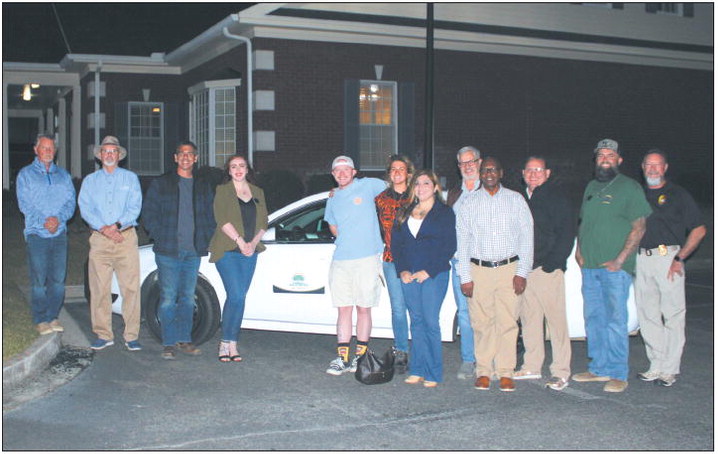State’s Rural Strike Team Holds Inaugural Session in Vidalia
The Governor’s Rural Strike team, which held its inaugural session in Vidalia recently, heard from representatives of several area counties about their specific economic development needs. The meeting was the first of many that will be held in rural communities across the state in the next few weeks and was intended to bring the team and members of a regional focus group face-to-face to discuss how to facilitate growth their communities.
The meeting came as Georgia was declared the top state in the nation in which to do business for the eighth year in a row. “Thanks to our nationleading workforce development efforts, resilient job creators, and strong continued from page
probusiness environment, Georgia is emerging from the global pandemic with unprecedented economic momentum,” Governor Brian Kemp said. He noted that his administration will remain focused on building this solid foundation and continuing to bring more jobs and opportunities to Georgians.
Georgia’s accolades came from Area Development, which is considered the leading executive magazine covering corporate site selection and relocation. Each year, the publication conducts an annual poll of approximately 50 leading site consulting firms from across the U.S. The poll considers 13 different factors to determine which state ranks highest in economic development.
In addition to achieving the Top State status, Georgia earned a No. 1 ranking in five categories, including overall cost of doing business, cooperative and response state government, competitive labor environment, workforce development programs, and available real estate.
The recognition follows Kemp’s announcement that the state set new economic development records during FY21 in spite of the worldwide COVID-19 pandemic. During this period, investments in Georgia increased by 4% while job creation increased 5% above prior state economic development records Between July 1, 2020, and June 30, 2021, new investments totaled $10.97 billion and 33,439 jobs were created.
The Governor and the General Assembly called for a $40M Rural Innovation Fund to be included in the FY 2022 budget to support economic development efforts in rural Georgia. The OneGeorgia Authority is in the process of developing and adopting rules for the program and will oversee the implementation of the program.
Kemp committed $875M of the State Fiscal Recovery Fund for economic development ($325M), broadband ($300M) and water/sewer infrastructure ($250M). Rural communities can apply for these funds if they have an eligible project.
A year ago, Kemp announced the creation of a Rural Strike Team whose purpose is to bring jobs, investment and economic development to all corners of the state. Soon after, Brian Marlowe was tapped to lead the Team.
“To keep rural Georgia strong and remain the top state for business, I am laserfocused on bringing projects of regional significance to communities wanting to grow,” Kemp said. “By partnering with elected officials and economic developers, we can highlight the incredible people, places, and resources that exist outside of major metro areas.” He said the Strike Team will raise the visibility of regional economic development assets—specifically, large industrial sites outside of metro Atlanta—and united communities to market those sites to potential prospects.
“These large prospects will benefit multiple counties, dozens of communities, and hundreds of hardworking Georgia families. Working together we will ensure rural Georgia’s best days are ahead,” the Governor said.
As Executive Director of the Strike Team, Marlowe is working on the Governor’s behalf to actively facilitate new opportunities for rural Georgia. Marlowe brings a wealth of knowledge to his new assignment. He has served as Tift County Development Authority President and CEO and has extensive experience in economic development and local government in rural Georgia. He has a successful track record of new industry locations as well as existing industry expansions representing thousands of jobs and hundreds of millions of dollars in local investment.
Following the Vidalia session held at the Greater Vidalia Chamber office, Marlowe explained that the meeting was held in response to surveys sent out by the Strike Team last summer. It was the first step in the Team’s plan of action.
“We generated a comprehensive list of Development Authorities throughout Georgia from the Georgia Economic Development Association and the Georgia Department of Community Affairs. We had a great response from our rural communities, with 84.6% responding to the survey,” Marlowe explained. The survey covered a broad range of topics including marketing, regional initiatives, sites/ buildings and identifying challenges to economic development in their respective communities.
Workforce and infrastructure are the top two issues/needs that have been identified in the survey, Marlowe said. Cited as economic development challenges were education of the workforce; housing of the workforce; available land and/or buildings; funding; and collaboration with local, state and federal entities. Most of the authorities surveyed did not have an economic development marketing plan for their communities.
Marlowe expects the process of facilitating focus groups in each region of the state to be completed by the end of this year. Thereafter, the information in these focus sessions will be compiled to develop a plan of action for each region.
“This is still a work in progress, and Governor Kemp will make some more appointments to the Team,” Marlowe said. So far, Marlowe has enlisted the help of Darrell L. Moore, Executive Director for the Center for South Georgia Regional Impact at Valdosta State University, and Scott Purvis, a Community and Economic Development Manager with Georgia Power.
The Rural Strike Team will eventually be made up of a core group of about seven members and supported by 12 or more organizations representing numerous individuals based on geographic location and project specific parameters. “We have been on conference calls with the University System’s Board of Regents, Georgia Tech, Abraham Baldwin College, the Georgia Department of Transportation and many others,” Marlowe said. “Everybody wants to help with this initiative because they know how important it is to the Governor.”
Marlowe asked Purvis to assist in mapping strategic assets in rural Georgia. “We will be reaching out to the other utility companies to assist us in mapping strategic assets in other parts of the State. Once we have compiled this information, we will assist communities in developing marketing plans for said assets,” Marlowe explained.
He added that there might be some opportunity for some cost-share with developing those plans. “We will see if some public state monies can be used for that. We are working on that now,” he said. He said that the team will reach out and recruit consultants and prospects for strategic assets to help communities market their assets and will make community visits on an as needed basis. “We may be in North Georgia today and South Georgia tomorrow.” The Team also plans to assign a numeric value to each community in terms of readiness for community development. A Community Readiness Index with criteria will be developed and communities will be invited to participate. “Everyone can do this to get assessment of where they are in the process. This will be an in-depth assessment to provide an objective look at their economic development efforts. This will also include identifying challenges and opportunities within the community.” Strike Team’s Purpose at a Glance The Strike Team’s Mission is to support Georgia’s rural communities by eliminating obstacles and enhancing their competitive advantages through partnerships that create opportunity and success in rural Georgia. The mission is based on three core principles, also known as the 3 C’s: Cultivate Opportunity; Champion Rural Prosperity; Celebrate Success. The Team’s vision is to create a productive working relationship and strategic partners to bring jobs and investment to all of rural Georgia for a prosperous future. The Team’s eight core functions are: Survey rural econom ic development professionals Facilitate regional fo –
cus groups Map strategic assets in rural Georgia Assist communities with developing marketing plans Recruit consultants/ prospects for strategic assets Conduct community
visits
Provide project man –
agement support And develop a Com munity Readiness Index.

SECCA DONATION — Oxford of Lyons presented Southeastern Early College and Career Academy, SECCA, with a $6,000 donation through the Oxford Foundation and a company-wide educational initiative. SECCA will use the money to help fund the Make It-Move It Manufacturing and Logistics Class SECCA is hosting this fall for high school seniors. L to R: Flora Torres, Oxford Import Administrator; Shelly Smith, SECCA CEO; Angie McDaniel, Oxford Senior Manager, International Operations; and David Avery, SECCA Director of High School Programs..






